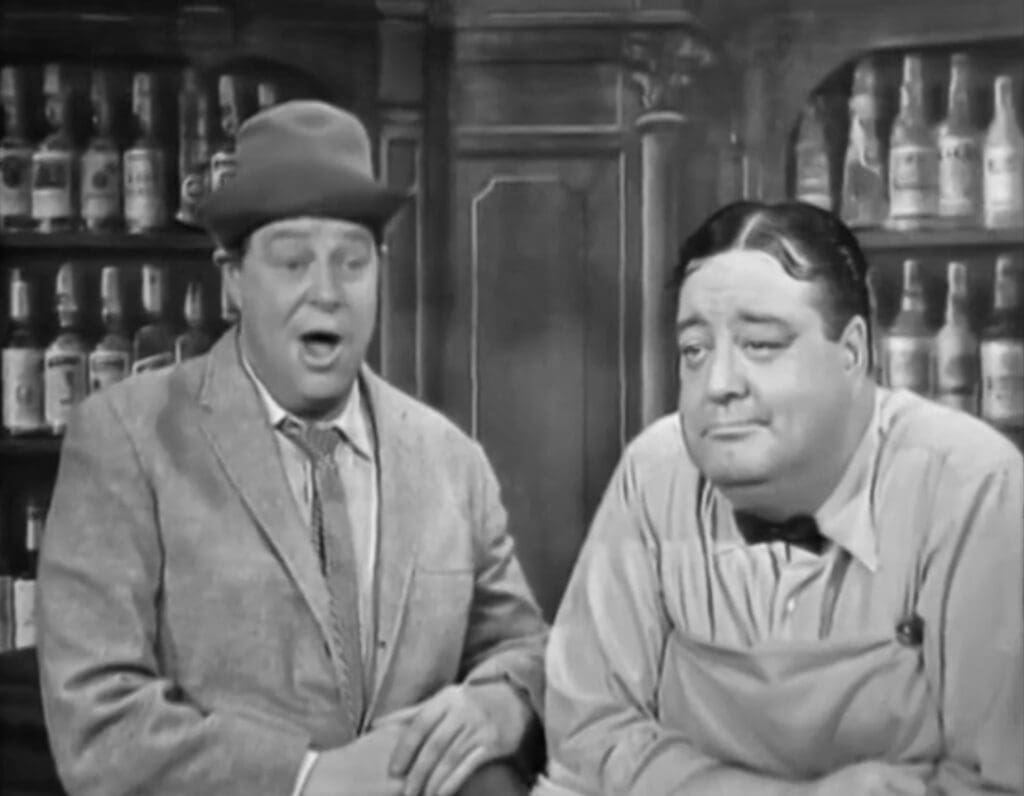A man with the dopiest face imaginable, always ready to break into a broad grin and a goofy laugh, is talking to Joe the Bartender about the only day he ever went to school. His name is Crazy Guggenheim.
“The teacher, she asks me, Who wrote the Constitution? I said, I didn’t do it! So she sends me straight home, and she says, You stay there till you can bring back your father! My father, Joe, he stuck up for me. He says to the teacher, Why did you send my kid home from school? She says, I asked him who wrote the Constitution, and he says he didn’t do it. And my father says, If my kid says he didn’t do it, he didn’t do it!”
A few minutes later, Crazy says that when he was a boy, he had to support his big family – “There were twelve of us, Joe, six boys and five girls!” – first by taking on a Polish champion who outweighed him by sixty pounds – “He beat my brains out,” says Crazy – and then by singing.
“I can sing anything, Joe,” he says. Joe rolls his eyes and can’t believe it. We don’t, either. So he tells “Mr. Dennehy,” the unseen character whom Joe addresses by facing the audience, to play Number Three on the jukebox.
The show’s orchestra then takes up the love song, “Because of You.” And Frank Fontaine, “Crazy,” sings the first verse, in a powerful and beautiful baritone, with just a trace now and then of his character’s comic manner. Joe – Jackie Gleason as the straight man – looks toward the audience in astonishment and appreciation.
No snark, nothing off-color, no politics, nothing but pure merriment.
And why am I writing this for Roman Catholics?
That’s what both Frank Fontaine and Jackie Gleason were. Frank was a devout Catholic, of rock-solid devotion to the Church and to his wife and their eleven children. Jackie was a bad Catholic, with a soured marriage and a wayward eye. “Jackie doesn’t practice it,” said Jack Haley, the Tin Man in The Wizard of Oz, himself a devoted Catholic, “but he believes it.”
Both Fontaine and Gleason were tireless in works of charity, and for Fontaine that was the more impressive, as he tailored his career so that he could spend most of his time with his family, and thus he had nowhere near the means that Jackie had.

Frank Fontaine married his high school sweetheart Alma in 1937, when she was 17, and he was two days shy of his own 17th birthday, and no, it wasn’t a shotgun wedding. Their first child was born in 1939. He then left school and went immediately to work, performing in clubs in the Boston area, where they lived. He had developed the Crazy Guggenheim voice and character when he was just eight years old, to make his buddies laugh, he said, rather than beating each other up all the time.
After Pearl Harbor, he spent three years as a soldier in the army. Even so, he and Alma had eleven children, nine boys and two girls. One of his boys appears at the end of the sketch I have described above, after Joe tells Crazy to bring him in. The audience breaks out into laughter before we even see a thing. It’s a boy who looks like Dad and who has adopted Dad’s “Crazy” manner, basically doing an impersonation of his own father.
Fontaine died of a massive coronary in 1978, when he was just 58 years old. He was in Spokane, Washington, performing in a charity benefit. Gleason, never in good health, overweight and too much given to alcohol and nicotine, died in 1987 at the age of 71. His funeral Mass was celebrated in Miami, in the cathedral.
Good humor requires a certain relaxation. You can’t have fun with people on edge, spying out things to be offended by, cultivating touchiness and sinning against charity. Merriment takes good humor and runs or dances with it.
You cannot be merry if you are concerned always with how you look to other people. You can also not be merry – this is harder to describe – if you possess no innocence of heart; if you have banished or stunted or spoiled or warped the child within you.
Children loved Crazy Guggenheim; I certainly did, when I was a little boy. But then, he appealed to them straight out, as did the warm-hearted Red Skelton, a fellow clown who couldn’t help laughing at his own jokes. You could imagine either one of them as a steam-fitter or a longshoreman. You could not imagine them as politicians. “May God bless,” said Red, as the last words in each of his shows. The harsh and sour don’t do that.
Jesus says that unless we become like little children, we shall not enter the kingdom of Heaven. If you want to go to the super-serious place of all-devouring ideology, ambition, ingratitude, and avarice, a place where souls mock and sneer and snicker, where people despise their own forebears, you will find the road laid out for you at school, in college, in most places of work, and on the Internet.
Smooth and broad is the way that leads to destruction. That place is childless, besides.
I don’t know of any comics now who appeal to children. There isn’t any Shari Lewis with the puppet Lambchop, or a troupe of Italian puppeteers animating the little mouse Topo Gigio for his amiable conversations with “Eddie” on The Ed Sullivan Show. Children also are moved by pageantry, which can sometimes be mirth in uniform, and by solemnity, which in its most blessed form is also like mirth, encouraging us to forget ourselves, rather to lose ourselves in the contemplation of what is beyond. Medieval man understood the connection, often solemn, often merry. Do we










